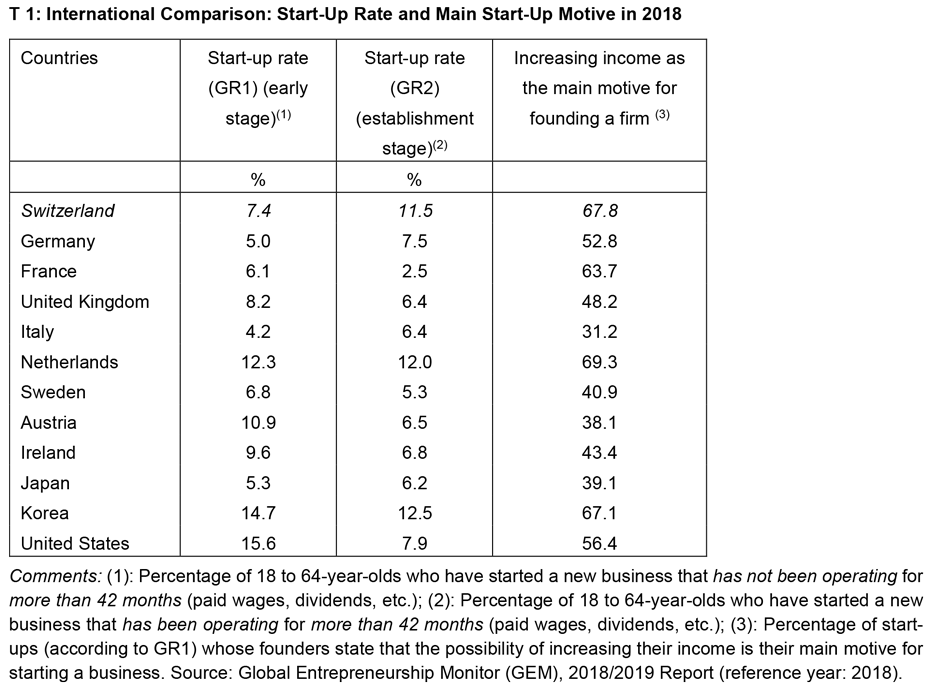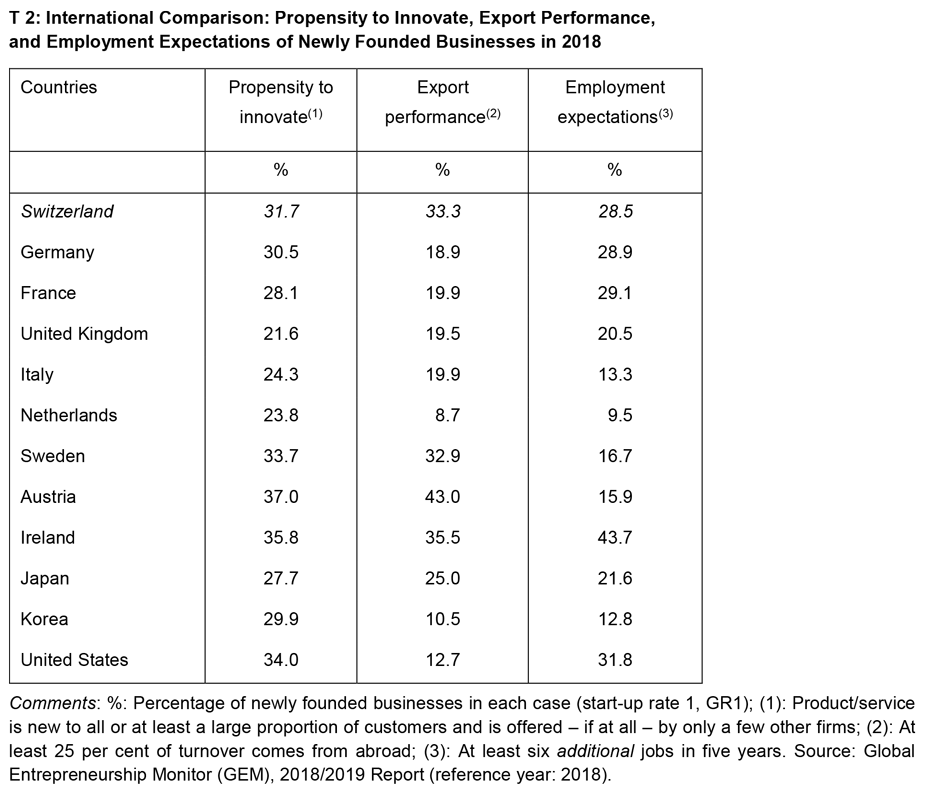Business start-ups in Switzerland: the story so far
- Innovation
- KOF Bulletin
How high is the ‘start-up rate’ in Switzerland compared with other countries? What is the main motive for setting up businesses in Switzerland? What competences are particularly relevant for start-ups and what factors encourage innovation performance? This article provides an overview of the most important findings of KOF’s research on business start-ups in Switzerland.

The technology policy debate of recent years has increasingly viewed the founding of new businesses as a driving force for economic growth. The theory of innovation in evolutionary economics emphasises that knowledge-intensive young firms fulfil a particularly important function in the innovation process. Typically they explore fundamentally new solutions to problems, of which only a few subsequently prevail through market selection. However, these types of young firms are very important on the technology-related knowledge front, as fundamentally new ideas are particularly in demand under these circumstances. The process of setting up a company is thus an important search and selection process in a technologically advanced economy.
In the opinion of critical observers, the importance of start-ups in comparison with existing firms for the innovation performance of an economy is overestimated to the extent that policy often calls for or practises a general promotion of start-ups, without regard to whether all new firms meet the requirements as ‘innovation drivers’.
Start-up activities on an international comparison
For international comparisons, various so-called start-up rates are used, which are defined on the basis of population shares of self-employed persons. How should the start-up rate in Switzerland – measured by the share of self-employed persons in the population aged 18 to 64 – be assessed on an international comparison? Table 1 provides information on this for 2018, based on data of the Global Entrepreneurship Monitor (GEM).
In terms of its actual early-stage start-up rate (‘self-employed for less than 42 months’; column 1 in Table 1), Switzerland, with a start-up rate of 7.4 per cent, is roughly in the middle of the range of countries selected here. However, in terms of the ‘survival rate’ in the establishment stage (‘self-employed for more than 3.5 years’; column 2 in Table 1), Switzerland is in third place with 11.5 per cent, i.e. it occupies a very good position. Interestingly, Switzerland is in second place in terms of the – according to empirical research, at least – most successful main motive for setting up a business, namely ‘increasing one’s income’ (column 3 in Table 1); 67.8 per cent of Swiss individuals setting up businesses state that increasing their income is their main motive for founding a firm.
Performance of start-ups on an international comparison
Information on the propensity to innovate, export performance, and employment expectations of newly founded companies in 2018 can be found in Table 2. Roughly 32 per cent of Swiss start-ups offer a new product for all customers (or at least a large proportion of them) (column 1 in Table 2). This figure puts Switzerland in fourth place after Austria, Sweden and the United States. 33.3 per cent of Swiss start-ups have an export share of 25 per cent of turnover; only Ireland and Austria have a higher share of exporting start-ups (column 2 in Table 2). Switzerland also performs well in terms of expected or planned future employment (at least six additional jobs in five years), with 28.5 per cent of all start-ups.
Innovation-driven characteristics of individuals founding businesses in Switzerland
Drawing on three surveys of firms in the 1996/97 start-up cohort in 2000, 2003 and 2006, KOF was able to build up a unique data set containing detailed information on various characteristics of the start-ups’ founders that could be of significance for the new firms’ innovation performance. The most important of these characteristics were identified using in-depth econometric studies based on these data.
The university education of the firms’ founders is obviously key to their innovation-driven behaviour. Technical expertise is beneficial to research and development (R&D). The availability of technical and commercial expertise is relevant for R&D as well as for the realisation of innovations in the form of new or significantly improved products. Interestingly, a qualification exclusively in business administration is more of a disadvantage when it comes to innovation – presumably because of a lack of knowledge relevant to innovation. Furthermore, R&D experience gained from previous activities is an important factor for both innovation variables.
Somewhat surprisingly, experience as a self-employed individual is not an advantage when it comes to ‘innovativeness’, and industry experience is even a disadvantage in terms of developing R&D activities. The existence of a team of founders instead of just a single founder is conducive to the introduction of new products. And, finally, the motivation to realise one’s own ideas developed during previous employments is another important determinant of the innovation-driven behaviour of a newly founded company.
In summary, there are four factors that boost the innovative performance of a new firm on both the input and output sides: a university education, a combination of technical and commercial expertise, experience of R&D, and the motivation to realise one’s own ideas.
A longer version of this article can be found on our website.
Contact
Schweiz

